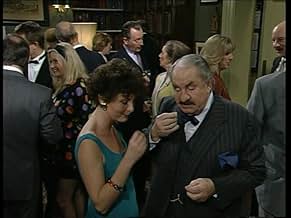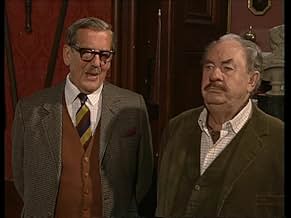NOTE IMDb
8,4/10
1,9 k
MA NOTE
Ajouter une intrigue dans votre langueThe cases of a portly and eccentric criminal law barrister.The cases of a portly and eccentric criminal law barrister.The cases of a portly and eccentric criminal law barrister.
- Nommé pour 2 Primetime Emmys
- 10 nominations au total
Parcourir les épisodes
Avis à la une
Over the past decade I've watched The Sopranos, The Wire, Breaking Bad and The West Wing.
Rumpole stands alongside them as classic TV.
Great stories, brilliant scripts and fantastic acting.
It has that mark of a really great piece of drama in that after watching an hour long episode, I'll sit and discuss it for an hour more.
It's amazing to see, almost 40 years later, how much has changed in the UK....and how much hasn't! It may be dated in a few places, but it's universal in many many more....I imagine that it cost less to make EVERY episode of Rumpole (and there are lots!) than it did to make one episode of Breaking Bad or West Wing.
Just go watch it!
Rumpole stands alongside them as classic TV.
Great stories, brilliant scripts and fantastic acting.
It has that mark of a really great piece of drama in that after watching an hour long episode, I'll sit and discuss it for an hour more.
It's amazing to see, almost 40 years later, how much has changed in the UK....and how much hasn't! It may be dated in a few places, but it's universal in many many more....I imagine that it cost less to make EVERY episode of Rumpole (and there are lots!) than it did to make one episode of Breaking Bad or West Wing.
Just go watch it!
It is hard to know who deserves the most credit for this courtroom series; author John Mortimer QC (a noted barrister himself), or actor Leo McKern.
Obviously, the series was written with the benefit of intimate knowledge of the English legal system, but almost every branch of it is portrayed very unflatteringly. Most Barristers are shown as smug and pompous, fencing with each other in Latin phrases while the defendant and jury look baffled; policemen are bent, solicitors are shady and judges are either more concerned with barristers' correct dress rather than the evidence, or sadistic and bigoted.
The seamier side of the profession is also shown; with prestigious barristers having to work from poky "chambers", at the mercy of clerks for their work ("briefs") and undervalued secretaries for their paperwork.
In such a world, a weary and introspective character such as Rumpole dominates the scene. McKern's booming delivery and range of facial expressions make this all too easy. The language is a delight, as Rumpole quotes Browning, Tennyson, Shakespeare at will. Some of the most hilarious scenes occur as lawyers take on their clients' personas and start arguing their cases with each other in the first person, in bars or restaurants.
Rumpole's home life with wife Hilda, "She who must be obeyed", is also shown as quite a caricature, as Hilda Rumpole is portrayed as having few interests beyond her husband's lowly position in the pecking order, and household cleaning agents.
Any one of the episodes makes good viewing.
Obviously, the series was written with the benefit of intimate knowledge of the English legal system, but almost every branch of it is portrayed very unflatteringly. Most Barristers are shown as smug and pompous, fencing with each other in Latin phrases while the defendant and jury look baffled; policemen are bent, solicitors are shady and judges are either more concerned with barristers' correct dress rather than the evidence, or sadistic and bigoted.
The seamier side of the profession is also shown; with prestigious barristers having to work from poky "chambers", at the mercy of clerks for their work ("briefs") and undervalued secretaries for their paperwork.
In such a world, a weary and introspective character such as Rumpole dominates the scene. McKern's booming delivery and range of facial expressions make this all too easy. The language is a delight, as Rumpole quotes Browning, Tennyson, Shakespeare at will. Some of the most hilarious scenes occur as lawyers take on their clients' personas and start arguing their cases with each other in the first person, in bars or restaurants.
Rumpole's home life with wife Hilda, "She who must be obeyed", is also shown as quite a caricature, as Hilda Rumpole is portrayed as having few interests beyond her husband's lowly position in the pecking order, and household cleaning agents.
Any one of the episodes makes good viewing.
I think everyone can identify with the lead character Horace Rumpole. That's because he's a crafty, witty barrister surrounded by a bunch of stuffed shirts and idiots. There's Claude Erskine-Brown, the close confidant of Rumpole's who seems to stumble from one disaster to another; Phylida "Portia" Erskine-Brown, Claude's wife and about a third of his source of problems; Judge Gutherie Featherstone, a rather hapless man who gets caught up in a sex scandal right as he's trying to decide on a case in that matter; junior clark Liz Probert, played wonderfully by Leo's daughter Abigail McKern; the hapless Timson clan, who Rumpole constantly rescues from trouble despite their antics, and most of all, we should not forget "She who must be obeyed" - Hilda Rumpole. The cast was a superb choice and the writing was excellent. What was sad about this series is its ending - it's the kind of thing you don't want to end.
Rarely has television fit a role and an actor together as perfectly as Rumpole and Leo McKern. (A couple of other examples would be Vic Morrow in "Combat!" and Derek Jacobi in "I, Cladius".) The singular pleasure these episodes afford is watching McKern act as the mildly cynical, but resolutely libertarian, barrister. It is easy to see why McKern came to loathe playing the part since it is the ultimate case of typecasting. One can less think of McKern sans Rumpole than he can Connery sans Bond. Better to rewatch Rumpole than the colorless blather on Court TV.
The scripts and additional cast are good enough to make repeated watching of McKern worthwhile.
The scripts and additional cast are good enough to make repeated watching of McKern worthwhile.
Rumpole, a barrister spewing poetry and thunder and husband of She-Who-Must-Be-Obeyed, entertains with a unique style of oratory, wit, and his own particular slant on the world. In a world drowning in political correctness, Rumpole is a life saver. Rumpole is also one of my favorite of all time characters. The stories and supporting cast are refreshingly British and the entire series is an absolute delight! I'm so pleased this was finally released on dvd.
Le saviez-vous
- AnecdotesRumpole has a penchant for giving literary or historical nicknames to friends and foes. His wife Hilda's moniker, "She Who Must Be Obeyed," was originally applied to the title character of H. Rider Haggard's novel "She." Phyllida Trant Erskine-Brown's nickname, "Portia," is from William Shakespeare's "The Merchant of Venice." Samuel Ballard is dubbed "Soapy Sam" after Bishop Samuel Wilberforce', who is now best remembered for debating Thomas Huxley over Charles Darwin's theory of evolution, but regarded in his own time as rather a slick operator. He calls Judge Graves the "whited sepulchre", a Biblical allusion (Matthew 27).
- Citations
Horace Rumpole: She who must be obeyed!
- ConnexionsFeatured in The 33rd Annual Primetime Emmy Awards (1981)
Meilleurs choix
Connectez-vous pour évaluer et suivre la liste de favoris afin de recevoir des recommandations personnalisées
- How many seasons does Rumpole of the Bailey have?Alimenté par Alexa
Détails
Contribuer à cette page
Suggérer une modification ou ajouter du contenu manquant

Lacune principale
By what name was Rumpole of the Bailey (1978) officially released in India in English?
Répondre























